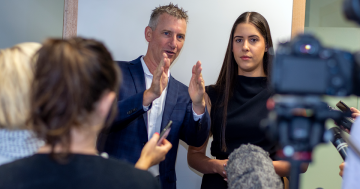Manfred F. R. Kets de Vries* says purposeful storytelling isn’t show business, it’s good business.
 A CEO stands before a room of jaded employees, presenting an endless series of PowerPoint slides packed with information.
A CEO stands before a room of jaded employees, presenting an endless series of PowerPoint slides packed with information.
The energy drains from the room as everyone struggles to digest all the details and keep their eyes open.
When it’s finally over, all agree the meeting was a complete waste of time.
Does this scene seem all-too familiar? While executives often lack the ability to tell good stories that fully engage their employees, smart leaders know that stories are a secret weapon – the most powerful instrument in their communication toolbox.
They use anecdotes to take people on a journey, expertly sketch their vision and align teams behind it.
When done right, storytelling is an underrated skill that completely transforms the way people connect and communicate.
Stories help others see and feel things from a different perspective and provide context, meaning and opportunities to strengthen relationships.
Tales can also evoke emotional associations and stir people’s imaginations, transporting listeners and nudging them to uncover greater insights about their own lives.
In both politics and business, great storytellers in leadership positions have accomplished great deeds.
Master storyteller Nelson Mandela used his personal experiences to solve seemingly insurmountable social problems and transform apartheid South Africa into a rainbow nation.
The late Steve Jobs was also a firm believer in the power of storytelling.
He famously said: “The most powerful person in the world is the storyteller. The storyteller sets the vision, values and agenda of an entire generation that is to come.”
And that’s exactly what he did with Apple.
Remarkable storytellers like Mandela and Jobs were able to ignite the imaginations of their listeners.
They quickly realised that facts and figures can alienate people whereas thought-provoking stories draw them in.
Indeed, stories have the power to delight, enchant, touch, teach, remind, inspire, motivate and challenge.
People listen to captivating stories and recall the core messages even if they don’t necessarily remember all the details.
Great stories endure and help listeners remember ideas and concepts in ways that convoluted PowerPoint presentations never will.
Why storytelling works
Neurological science research can provide some insights into what makes storytelling so effective.
When we listen to a story, neurons in our brain fire in similar ways to those of the storyteller, a process known as “neural coupling”.
When someone describes their emotional experiences in a story, mirror neurons in the brain of the listener are activated.
Essentially, the listener’s brain waves synchronise with those of the storyteller.
Stories allow listeners to imagine themselves in the same situation as the storyteller, connecting people at a human level that can never be matched by logical arguments or factual information.
When a particularly good story is being told, our brain releases oxytocin, often known as the “bonding” or “love” hormone.
This helps foster an emotional attachment to the characters in the story without the need for direct or physical contact.
Emotional connection also triggers associative thinking, whereby listeners link the themes in the narrative to their own life stories.
Psychoanalyst Carl Jung identified that all humans share a collective unconscious – universal mental concepts that influence the way we interact with the world.
In a similar vein, our life stories share common themes such as coming of age, the circle of life, the loss of innocence, the power of love, the triumph over adversity, the struggle between good and evil and the search for power, freedom, truth and justice.
Each life story can be considered a “hero’s journey” as it involves adventure, challenge, self-realisation and transformation.
These universal stories are not just myths, legends and fables – they demonstrate how we come to terms with the meaning and purpose of our life and cope with anxiety, disappointment, success, heartache and tragedy.
At the same time, these stories contain an element of hope: There is often a eureka moment when the hero realises how they can resolve their predicament.
Leaders can use these shared experiences to connect with their audience.
How to be a better storyteller
Try to be honest
Storytelling can be especially powerful if you’re prepared to unveil your defeats and successes, hopes for the future and deepest fears.
Weaving your strengths, vulnerabilities and dreams into your anecdotes will bridge the divide between you and your team and help foster mutual understanding and empathy.
It’s not all about you
Storytelling is an interactive process and not solely about the narrator.
Consider what effect the story will have on your audience and how they will interpret it given the challenges they are facing.
Appeal to emotions
Tell stories that affect people on an emotional level by connecting to their wishes, fears and frustrations.
You want your audience to recognise fragments of themselves and their own life stories in your tales.
Embark on a hero’s journey
Transport your audience to a world of exploration and adventure.
Taking listeners on a somewhat familiar hero’s journey will help them gain greater self-awareness and even possibly bring powerful unconscious emotional reactions to the fore.
Shine a light
Help listeners identify and understand the challenges they face by telling tales that encourage them to reflect on their own dilemmas and why they act in certain ways.
Frame your stories so that they provide teachable moments and insightful solutions.
Set an example and don’t hold back
Sharing painful stories, secrets or shameful self-beliefs can be emotionally cleansing and cathartic for both the storyteller and the listener.
Detailing how you overcame a personal issue can encourage people to take similar steps, while deeply personal stories are humanising, empowering and can even encourage healing.
Stories are the building blocks of empathy and compassion and a way of getting to the heart of who you are.
They foster feelings of community and interdependency and help people feel more in control and less alone in the challenges they face.
Leaders who tell compelling stories can move any audience from apathy to empathy, and ultimately to action.
*Manfred F. R. Kets de Vries is the Distinguished Clinical Professor of Leadership Development and Organisational Change and the Raoul de Vitry d’Avaucourt Chaired Professor of Leadership Development, Emeritus, at INSEAD.
This article first appeared at knowledge.insead.edu.











